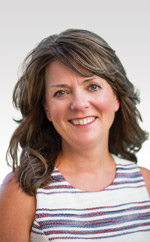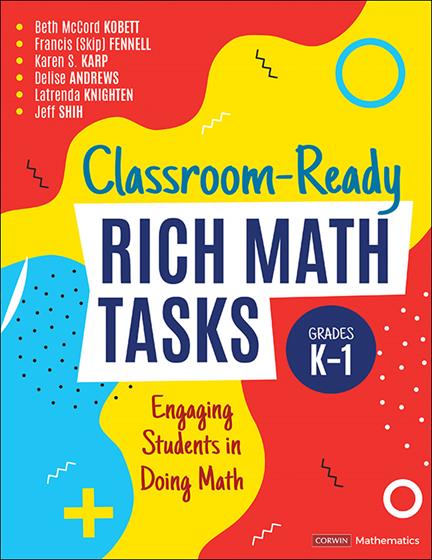
Hands-on, Practical Guidance for Educators
From math,
literacy, equity, multilingual learners, and SEL, to assessment, school counseling,
and education leadership, our books are research-based and authored by experts
on topics most relevant to what educators are facing today.
Classroom-Ready Rich Math Tasks, Grades K-1
With 56 ready-to-implement, engaging math tasks, this is the guide to giving your primary students the deepest mathematical experiences possible.
- Grade Level: K-1
- ISBN: 9781544399102
- Published By: Corwin
- Series: Corwin Mathematics Series
- Year: 2021
- Page Count: 336
- Publication date: May 06, 2021
Review Copies
Description
Do you work tirelessly to make your math lessons meaningful, challenging, accessible, and engaging? Do you spend hours you don’t have searching for, adapting, and creating tasks to provide rich experiences for your students that supplement your mathematics curriculum? Help has arrived! Classroom Ready-Rich Math Tasks for Grades K-1 details 56 research- and standards-aligned, high-cognitive-demand tasks that will have your students doing deep-problem-based learning. These ready-to-implement, engaging tasks connect skills, concepts and practices, while encouraging students to reason, problem-solve, discuss, explore multiple solution pathways, connect multiple representations, and justify their thinking. They help students monitor their own thinking and connect the mathematics they know to new situations. In other words, these tasks allow students to truly do mathematics! Written with a strengths-based lens and an attentiveness to all students, this guide includes:
• Complete task-based lessons, referencing mathematics standards and practices, vocabulary, and materials
• Downloadable planning tools, student resource pages, and thoughtful questions, and formative assessment prompts
• Guidance on preparing, launching, facilitating, and reflecting on each task
• Notes on access and equity, focusing on students’ strengths, productive struggle, and distance or alternative learning environments.
With concluding guidance on adapting or creating additional rich tasks for your students, this guide will help you give all of your students the deepest, most enriching and engaging mathematics learning experience possible.
Author(s)

Beth McCord Kobett
Beth McCord Kobett serves as Professor and Dean in the School of Education at Stevenson University, where she works closely with early childhood, elementary, and middle school preservice teachers. She brings experience as a classroom teacher, mathematics specialist, and university supervisor. Beth served on the NCTM Board and served as president of Association of Maryland Mathematics Teacher Educators. Beth has authored ten mathematics education books and supports professional learning efforts nationwide. She has been honored with awards such as the MCTM Mathematics Educator of the Year and Stevenson’s Rose Dawson Award for Excellence in Teaching. Deeply committed to her students, she strives to create a supportive, strengths-based learning environment that fosters curiosity, collaboration, and meaningful growth.

Francis (Skip) Fennell
Francis (Skip) Fennell is professor of education and Graduate and Professional Studies, emeritus at McDaniel College in Maryland. He is a former classroom teacher, principal, and supervisor of instruction, and past president of the Association of Mathematics Teacher Educators (AMTE), the Research Council on Mathematics Learning (RCML), and the National Council of Teachers of Mathematics (NCTM). He is a recipient of the Mathematics Educator of the Year Award from the Maryland Council of Teachers of Mathematics (MCTM), the Glenn Gilbert National Leadership Award from NCSM: Leadership in Mathematics Education, the Excellence in Leadership and Service in Mathematics Teacher Education Award from AMTE, the James Heddens Distinguished Service Award from RCML, and Lifetime Achievement Awards from both MCTM and NCTM. Skip’s many publications including Achieving Fluency: Special Education and Mathematics (NCTM, 2011), and The Formative 5: In Action (Corwin, 2024) have been influenced by his classroom experiences and decades long focus on assessment, number sense, fractions, elementary mathematics specialists and teacher education.

Karen S. Karp
Karen S. Karp is a mathematics educator who focuses on the intersection of mathematics education and special education. She is a former professor at Johns Hopkins University and at the University of Louisville where she is professor emerita. Early in her career she received a Development Award from the Joseph P. Kennedy, Jr. Foundation to support more seamless integration between general education and special education. She is the author or co-author of numerous publications including Assisting Students Struggling with Mathematics: Intervention in the Elementary Grades and Elementary and Middle School Mathematics. Karen was on the writing team of the NCTM/CEC Joint position statement on Teaching Mathematics to Students with Learning Disabilities. In 2024, she chaired the Topic Study Group on Teaching Mathematics to Students with Special Needs at the International Congress on Mathematical Education in Australia. She holds teaching/administrative certifications in elementary education, secondary mathematics, K-12 special education, and K-12 educational administration.

Delise Andrews
Delise Andrews is the 3-5 Mathematics Coordinator for Lincoln Public Schools in Lincoln, Nebraska. During her career, she has worked in both rural and urban districts and has taught mathematics to students at every age from Kindergarten through the 8th grade, undergraduate mathematics methods and mathematics content courses for pre-service teachers, and graduate level courses for teachers of mathematics. Delise is a recipient of the Presidential Award for Excellence in Mathematics and Science Teaching and is a Robert Noyce Master Teaching Fellow. Delise is an active member of the NCTM, serving as a past member and chair of the Professional Development Services Committee, member of regional conference committees, chair of the St. Louis annual conference committee, Professional Services facilitator, and Associate Editor for the Mathematics Teacher: Learning and Teaching K-12 journal. She is a co-author of the Grades K-1 and Grades 4-5 books in the Classroom Ready Rich Math Tasks: Engaging Students in Doing Math series.

Latrenda D. Knighten
Latrenda Knighten is President (2024 - 2026) of the National Council of Teachers of Mathematics (NCTM) and a retired Mathematics Supervisor from Baton Rouge, LA. She has been an educator for more than 30 years during which she has been a classroom teacher, science specialist, mathematics coach, instructional coach, and a mathematics content provider. An active member of many professional organizations, Latrenda is a past member of the National Council of Teachers of Mathematics, National Council of Supervisors of Mathematics, and the Benjamin Banneker Association Board of Directors. She is also the co-author of two books: Classroom-Ready Rich Math Tasks, Grades K - 1 and Five to Thrive: Answers to Your Biggest Questions About Teaching Elementary Math, K-5.
Table of Contents
Chapter 1: Doing-Math Tasks: What Are They, Why Are They Important, and How Do I Plan for Implementation?
Chapter 2: Laying the Groundwork for Teaching With Doing-Math Tasks
Chapter 3: Implementing a Doing-Math Task-Based Lesson
Chapter 4: Counting and Cardinality: Counting and Writing Numbers
Chapter 5: Counting and Cardinality: Counting Objects
Chapter 6: Operations and Algebraic Thinking: Patterns and Relationships
Chapter 7: Counting and Comparing
Chapter 8: Operations and Algebraic Thinking: Addition and Subtraction
Chapter 9: Operations and Algebraic Thinking: Addition and Subtraction Relationships
Chapter 10: Number and Operations in Base Ten: Place Value
Chapter 11: Number and Operations in Base Ten: Adding and Subtracting
Chapter 12: Measurement: Comparing, Ordering, Sorting, and Informal Measurement
Chapter 13: Measurement: Time
Chapter 14: Data: Represent and Interpret Data
Chapter 15: Geometry: Distinguishing Attributes and Naming and Identifying Shapes
Chapter 16: Geometry: Composing Shapes and Equal Shares
Chapter 17: Your Turn
Reviews
This book’s title reveals its promise. Classroom-Ready Rich Math Tasks offers teachers an abundant collection of practical challenges for engaging their students in building mathematical fluency and developing strategic reasoning—exactly what all the Mathematics Standards expect.Jay McTighe
Author and Educator
This book is exactly what every K–1 teacher needs! The 56 tasks are engaging, easily implemented, and most important, ‘classroom ready.’ The instructional strategies presented in the beginning chapters and the reflections emphasized in the last chapter provide the appropriate foundation for teachers of young children. As an experienced K–1 teacher, I guarantee that I would use the ideas presented and would encourage others to do so.Juanita Copley
Professor Emerita
As a district math leader, I appreciate this series because I know that any task my teachers choose will be high quality. I also appreciate the research-informed coaching provided in the first few chapters that will guide my teachers through selecting, planning, and implementing tasks to maximize their potential.Brian Bushart
Elementary Mathematics Curriculum Coordinator
Megan Franke
Interim Chair and Professor of Education
The core of great math teaching is the high-quality task, brought to life through rich interactions. These tasks must be engaging and both mathematically and pedagogically generative—of interesting content and mathematical processes and practices. This valuable book is filled with such tasks, as well as guidance in planning and implementing them and materials for maximum enjoyment and benefit for teachers and their students.Douglas H. Clements
Distinguished University Professor, Kennedy Endowed Chair in Early Childhood Learning, and Executive Director of the Marsico Institute for Early Learning
I highly recommend this book, which provides a research-based framework for engaging in rich tasks that are connected to and build on previous mathematical understanding, relevant contexts, and students’ experiences and resources, as well as connecting to mathematics teaching practice. The high cognitively demanding tasks included support the development of important mathematics norms, practices, and concepts.Robert Q. Berry, III
Samuel Braley Gray Professor of Mathematics Education
This book answers the often-asked question, ‘Where can I find good tasks?’ The authors have assembled a collection of rich mathematical tasks and provided guidance on how to plan and implement lessons around them in ways that will support opportunities for students to learn mathematics with understanding. This book is a game changer for kindergarten and first-grade teachers who want their students to do math!Margaret (Peg) Smith
Emeritus Faculty
Finding the right task that invites young learners to think and reason mathematically isn’t always easy. This impressive book offers various high-quality tasks and addresses planning and implementation considerations. It is an invaluable resource for everyone who strives to provide worthwhile learning experiences for kindergarten and first-grade mathematicians!Susie Katt
K–2 Mathematics Coordinator
By integrating the latest research with a powerful teacher voice, the authors have written a must-read for every teacher of mathematics who wants their students to have a more motivating and powerful classroom experience. But the authors don’t simply argue that teachers include high-cognitive demand tasks in their teaching—they take the next steps and actually demonstrate how to plan for, implement, and support these tasks so each student can authentically engage in doing mathematics!Matt Larson
Past President
Classroom-Ready Rich Math Tasks, Grades K–1 is an excellent resource for teachers, teacher educators, and professional development providers who want to engage students in high-level, cognitively demanding mathematics tasks. The book does an excellent job of explaining the why and the how of implementing doing mathematics tasks. To top it off, this book has a treasure trove of rich mathematics tasks for teachers to choose from.Kyndall Brown
Executive Director
This book is designed explicitly to support teachers as they reflect on their math teaching practice either individually—or in collaboration with colleagues. Not only does it pull together the essential research connected to planning, setup, and implementation of high-cognitive-demand tasks, it also helps them to implement a full, ready-made collection of tasks, and then eventually move to selecting, adapting, and creating tasks on their own.Nicole Rigelman
Professor of Mathematics Education
Review Copies
Related Resources
- Matching Number Names to Representations [Lessons and Strategies]
- Using Addition and Subtraction to Solve Word Problems [Lessons and Strategies]


